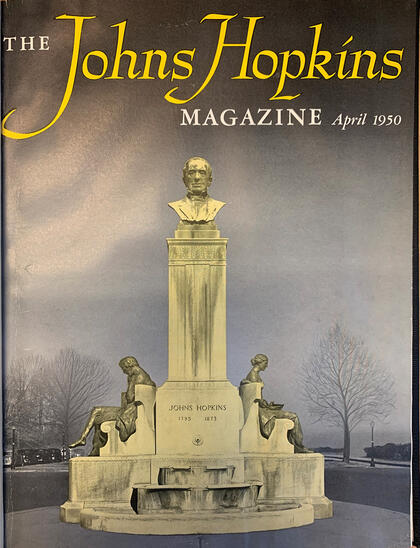Our Back Pages

Fifty years ago, Johns Hopkins Magazine published its first issue, with an introductory message, excerpted here, on the inside cover. Half a century later, the magazine continues to promote the goings-on of JHU—and broadcast the value of the lifesaving research done here.
"It is not intended as a magazine in which the reader will find an exhaustive treatment of his own specialty; if he looks for that, he will be disappointed. It is for the busy person who desires a quick, panoramic view, who wishes to "keep his oar in" areas beyond his own, that the Johns Hopkins Magazine has been designed. It is, frankly, an experiment. … But the end result, we hope, will be the performance of a genuine service to the alumni and other friends of Johns Hopkins—and, perhaps, to the cause of free research and education as a whole."
Research Saves Lives
Johns Hopkins is America's first research university. And today, research universities across this nation find themselves under siege—targeted by political maneuverings not seen since the Red Scare. The tactics may be different, but the fear they seek to instill is familiar. And dangerous.
President Ronald J. Daniels, in What Universities Owe Democracy, reminds us of the essential civic role that institutions like Hopkins serve. Universities, he argues, are not luxuries of the privileged. They are protectors of democracy's pulse—vessels for reason, havens for discourse, and engines of discovery. When we weaken them, we do not merely threaten academia—we threaten the future.
When I returned to the Homewood campus for Alumni Weekend this spring, President Daniels addressed alumni not as a leader perched above but as a fellow human walking with us through heartbreak and hope. He spoke of tides—of longing for a swell that lifts all voices, all vessels. His words struck a chord that echoed through the marble halls and leafy courtyards.
We are living through a tidal shift. A season of grief, languishing, and institutional fatigue. A time when scholars and public servants are asked not only to innovate but to defend their right to try.
The numbers tell a chilling story: Only 37% of Americans trust our universities today. That's a 20-point drop in just 10 years. This is not just a crisis of confidence—it's a crisis of purpose.
But here, in the heart and hearth of Hopkins, I remembered what we stand to lose.
This university is a modern-day stoa, an ancient gathering ground where reason meets rhetoric, where pathos meets logos, where curiosity is fostered, never feared. It is a place that never bends the knee to demonstrate allegiance to a dogma and courageously invites fidelity to discovery.
These classrooms and laboratories are sanctuaries. Sanctuaries where suffering is studied, lessened, healed. Research saves lives—not only through medicine but also through meaning.
As a veteran, I carry a sacred responsibility to defend the freedoms that allow this experiment in democracy to endure. That includes protecting institutions like Hopkins—places that allow the free exchange of ideas, the pursuit of truth, and the radical act of believing that tomorrow can be better than today.
Bill Kirst, A&S '00 Redmond, Washington
Making a Statement
Thank you for the brilliant alternate cover on the spring issue that reads Research Saves Lives. I rarely comment on political things, but things in this country are so far beyond the breaking point that I had to speak out and send my support for your actions. Nice work.
Holly Hartz, A&S '77 Moraga, California
Give us your feedback by sending a letter to the editor via email to jhmagazine@jhu.edu. (We reserve the right to edit letters for length, style, clarity, and civility.)
The opinions in these letters do not necessarily reflect the views of the magazine's editorial staff.
Posted in Voices+Opinion







